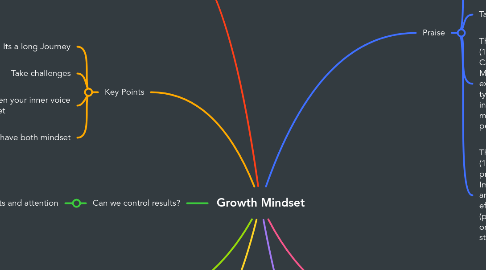Growth Mindset
by Muhammad Faisal


1. Can we control results?
1.1. Efforts and attention
2. Praise
2.1. Effort Praise
2.1.1. Avoid phrases that focus on natural ability, such as "you're smart" or "you're a natural".
2.1.2. Focus more on praising the process, not the outcome. For example, "I love how you were very thoughtful about the colors you chose!" .
2.1.3. Instead, focus on their efforts by saying "you worked hard on this" or "it looks like that was easy for you, let's find something more challenging".
2.2. Talent Praise
2.3. The study by Mueller and Dweck (1998) titled "Praise for Intelligence Can Undermine Children's Motivation and Performance" explored the effects of different types of praise, specifically praising intelligence, on children's motivation, enjoyment and performance on task.
2.4. The study by Kamins and Dweck (1999) titled "Person versus process praise and criticism: Implications for contingent self-worth and coping" investigated the effects of different types of praise (person praise vs. process praise) on children's self-worth and coping strategies.
3. Central Idea
3.1. Dweck's work aligns with the idea that the brain is malleable, and with effort and the right strategies, individuals can enhance their abilities over time.
4. Background Research Study
4.1. Praise for intelligence can undmine child motivation and performance
4.1.1. Intelligence Feedback
4.1.2. Effort Feedback
4.2. Why PF has negative impact?
4.2.1. Fixed mindset reinforcement
4.2.2. Fear of failure
4.2.3. Lack of Resiliance
4.2.4. Focus on outcome, not on process
4.2.5. Exernal Validation
